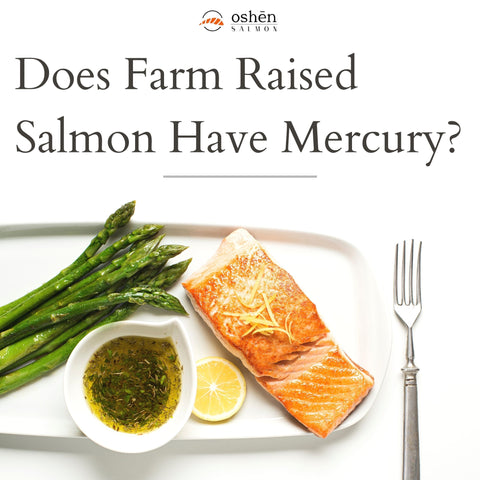Importance Of Including Salmon In Your Diet

Salmon is a versatile and nutritious food that offers numerous health benefits. It is rich in omega-3 fatty acids, which are essential for heart health, brain function, and reducing inflammation in the body. Salmon is also an excellent source of high-quality protein, vitamins, and minerals. Including salmon in your diet can help to improve cardiovascular health, boost brain function, support healthy weight management, and promote overall well-being. It is a delicious and easy way to incorporate nutrient-dense foods into your meals. Adding salmon to your diet can contribute to a well-rounded and healthy eating plan.
Benefits Of Consuming Salmon
Salmon offers numerous health benefits due to its nutrient-rich profile. It is a great source of omega-3 fatty acids, which promote heart health, improve brain function, and reduce inflammation in the body. The high-quality protein in salmon supports muscle growth and maintenance. Additionally, salmon is rich in vitamins and minerals such as vitamin D, vitamin B12, selenium, and potassium, which are essential for overall well-being. Regular consumption of salmon can contribute to a healthier cardiovascular system, enhance brain function, support healthy weight management, and boost overall vitality.
Nutritional Value Of Salmon
Salmon is not only delicious, but it also packs a nutritional punch. It is rich in protein, omega-3 fatty acids, vitamin D, vitamin B12, selenium, and potassium. In fact, a 3-ounce serving of salmon provides approximately 22 grams of protein, which is essential for muscle growth and repair. The omega-3 fatty acids found in salmon promote heart health and reduce inflammation in the body. Additionally, salmon is a good source of vitamin D, which is necessary for calcium absorption and strong bones. These nutrients make salmon a nutritious addition to any diet.
Health Risks Associated With Consuming Excessive Salmon

Consuming excessive amounts of salmon can pose certain health risks. While salmon is packed with valuable nutrients, it is important to be aware of potential risks associated with overconsumption. One concern is the high levels of mercury that can accumulate in larger predatory fish like salmon. Mercury can have detrimental effects on the nervous system, especially in pregnant women and young children. Another risk is the intake of saturated fats and cholesterol, which can increase the risk of heart disease if consumed in excess. Therefore, it is important to consume salmon in moderation and follow the recommended dietary guidelines to maintain optimal health.
Potential Risks Of Consuming Too Much Salmon
Consuming excessive amounts of salmon can pose certain health risks. While salmon is packed with valuable nutrients, it is important to be aware of potential risks associated with overconsumption. One concern is the high levels of mercury that can accumulate in larger predatory fish like salmon. Mercury can have detrimental effects on the nervous system, especially in pregnant women and young children. Another risk is the intake of saturated fats and cholesterol, which can increase the risk of heart disease if consumed in excess. Therefore, it is important to consume salmon in moderation and follow the recommended dietary guidelines to maintain optimal health.
Factors To Consider For Safe Consumption Levels
When it comes to determining safe consumption levels of salmon, there are a few factors to consider. Firstly, it is important to take into account the individual’s overall diet and health status. People with certain medical conditions, such as liver disease or high blood triglycerides, may need to limit their intake of fatty fish like salmon. Additionally, the source and quality of the salmon should be considered, as wild-caught salmon is generally lower in contaminants than farm-raised salmon. Lastly, portion size and frequency of consumption should be taken into account to ensure a balanced and varied diet. It is always advisable to consult with a healthcare professional or registered dietitian for personalized recommendations.
Dietary Recommendations For Salmon Intake

When it comes to the recommended intake of salmon, health experts suggest consuming it in moderation as part of a balanced diet. The American Heart Association recommends eating at least two servings of fatty fish, such as salmon, per week. Each serving should be around 3.5 ounces or about the size of a deck of cards. It is important to choose wild-caught salmon whenever possible, as it generally has lower levels of contaminants. Additionally, individuals with certain health conditions or specific dietary needs should consult with a healthcare professional for personalized recommendations.
Recommended Daily Intake Of Salmon
The recommended daily intake of salmon varies depending on factors such as age, overall health, and dietary needs. Generally, health experts suggest consuming at least two servings of salmon per week, with each serving being around 3.5 ounces or the size of a deck of cards. For children, it is recommended that they consume salmon twice a week. It is important to note that these recommendations may vary for individuals with specific health conditions or dietary restrictions. Consulting with a healthcare professional can provide personalized recommendations for optimal salmon consumption.
Guidelines From Health Organizations On Salmon Consumption
Health organizations, such as the American Heart Association (AHA) and the Dietary Guidelines for Americans, provide guidelines on salmon consumption. The AHA suggests that adults consume at least two servings of fatty fish, including salmon, per week to benefit from its omega-3 fatty acids. Additionally, the Dietary Guidelines for Americans recommend including seafood, like salmon, in a healthy eating pattern. These guidelines highlight the importance of incorporating salmon into a balanced diet to reap its nutritional benefits. It is essential to follow these recommendations while considering individual health needs and consulting with healthcare professionals.
Mercury Levels In Salmon

Mercury levels in salmon vary depending on the source and species of salmon. Salmon can accumulate mercury from the environment, particularly from polluted waters. However, studies have shown that the mercury content in salmon is relatively low compared to other fish. The Food and Drug Administration (FDA) guidelines recommend consuming a variety of fish, including salmon, that are low in mercury. Balanced consumption of salmon, along with other seafood options, can provide the health benefits of omega-3 fatty acids while minimizing exposure to mercury. It is important to follow the FDA guidelines for safe and healthy seafood consumption.
Understanding Mercury Levels In Salmon
Salmon can accumulate mercury from their environment, primarily from polluted waters. However, studies have shown that the mercury content in salmon is relatively low compared to other fish. The Food and Drug Administration (FDA) guidelines recommend consuming a variety of fish, including salmon, that are low in mercury. It is important to note that the health benefits of consuming salmon, such as its high omega-3 fatty acid content, outweigh the potential risks associated with mercury levels. Balancing your diet with a variety of seafood options will help minimize exposure to mercury while still enjoying the nutritional benefits of salmon.
Impacts Of Mercury Consumption On Health
Excessive consumption of mercury can have detrimental effects on health. Mercury is a neurotoxin that can affect the nervous system and brain development, particularly in fetuses and young children. It can impair cognitive function, lead to learning difficulties, and affect motor skills. Long-term exposure to high levels of mercury can also result in cardiovascular and immune system disorders. Additionally, mercury can accumulate in certain organs, such as the liver and kidneys, and potentially cause damage. Therefore, it is essential to be mindful of mercury levels in fish, including salmon, and consume them in moderation to minimize the risk to one’s health.
Balancing Your Diet With Salmon

Incorporating salmon into a balanced diet can provide many health benefits. It is important to include a variety of foods from different food groups to ensure a well-rounded diet. To balance your diet with salmon, consider the following:
- Portion control: Stick to the recommended serving size of salmon to avoid consuming excessive amounts.
- Pair with vegetables: Include a variety of vegetables alongside your salmon to increase the nutritional value of your meals.
- Combine with whole grains: Incorporate whole grains like quinoa or brown rice to add fiber and promote satiety.
- Alternate with other protein sources: While salmon is a great source of protein, it is essential to include other sources such as lean meats, legumes, or tofu for variety.
Remember, balance is key when it comes to a healthy diet, so enjoy salmon alongside other nutritious foods to optimize your overall health.
Incorporating Salmon Into A Balanced Diet
To incorporate salmon into a balanced diet, it is important to pair it with a variety of vegetables. This will increase the nutritional value of your meal and provide essential vitamins and minerals. Additionally, adding whole grains such as quinoa or brown rice can add fiber and promote satiety. It is also recommended to alternate salmon with other sources of protein like lean meats, legumes, or tofu for variety. By including salmon alongside other nutritious foods, you can optimize your overall health and enjoy a well-balanced diet.
Alternatives To Consuming Salmon For Variety
When it comes to incorporating variety into your diet, there are several alternatives to consuming salmon. These options can provide you with different flavors and nutritional profiles. Some alternatives to salmon include:
- Lean meats: Incorporate lean meats like chicken breast or turkey into your meals as an alternative source of protein.
- Legumes: Beans, lentils, and chickpeas are excellent plant-based options that offer protein, fiber, and various vitamins and minerals.
- Tofu: Tofu is a versatile, plant-based protein option that can be used in stir-fries, salads, or even as a substitute for fish in dishes like sushi rolls.
- Other types of fish: Mix things up by including other types of fish like cod, trout, or halibut into your meals for a different flavor and texture.
Remember to choose alternative protein sources that align with your dietary needs and preferences.
Conclusion

In conclusion, incorporating salmon into your diet can provide numerous health benefits due to its rich nutritional profile. However, it is important to consume salmon in moderation and be mindful of the potential risks associated with excessive consumption, such as exposure to mercury. The recommended daily intake of salmon varies depending on individual factors and guidelines from health organizations. It is also important to consider alternatives to salmon for variety in your diet. Balancing your overall diet with a variety of protein sources can help ensure a well-rounded and nutritious eating plan.
Summary Of Key Points On Salmon Consumption Limits
It is recommended that adults consume two servings (8 ounces) of salmon per week to enjoy its health benefits without exceeding safe consumption levels. Consuming more than two 4-ounce servings a week may lead to elevated levels of mercury and fat intake. Moderation is key to reaping the benefits of salmon, such as reducing the risk of heart disease, stroke, and cancer. Balancing your overall diet with a variety of protein sources is important for a well-rounded and nutritious eating plan.
Final Recommendations For A Healthy Diet
In conclusion, it is important to include salmon as part of a balanced and nutritious diet. However, moderation is key. Experts recommend consuming two servings (8 ounces) of salmon per week to enjoy its health benefits without exceeding safe consumption limits. It is also essential to consider the type of salmon, opting for baked, broiled, or grilled varieties over fried or breaded options. Additionally, individuals should aim for a diverse range of protein sources in their diet to ensure a well-rounded nutrition plan. By following these recommendations, individuals can maintain a healthy and balanced diet while reaping the benefits of consuming salmon in moderation.
FAQ About How Much Salmon Is Too Much: Considering Dietary Recommendations
Q: Why should one be cautious about their salmon consumption?
A: Salmon contains mercury, which can be harmful in excessive amounts.
Q: What are the dietary recommendations for salmon consumption?
A: The American Heart Association recommends eating at least two 3.5-ounce servings of fatty fish, like salmon, per week.
Q: Is it possible to consume too much salmon?
A: Yes, consuming large amounts of salmon can lead to an intake of high levels of mercury, which can have negative health effects.
Q: How can one monitor their salmon intake to ensure it is not excessive?
A: It is advisable to vary the types of fish consumed to limit exposure to mercury and follow general dietary guidelines for balanced nutrition.
Q: Are there specific populations that should be more cautious about salmon consumption?
A: Pregnant women, nursing mothers, and young children should be particularly careful about their salmon intake due to the risks associated with high mercury levels.
Q: What are the potential health risks of consuming too much salmon?
A: Potential health risks of excessive salmon consumption include mercury poisoning, neurological and developmental issues, and other health complications.

Welcome to Braddock Bay Tavern & Grill, where history, delicious cuisine, and stunning views come together to create an unforgettable experience. Our restaurant, situated on the picturesque edge of Lake Ontario, has a rich history that adds a unique charm to your dining experience. The roots of our establishment can be traced back to 1865, when it was first constructed as an icehouse. Over the years, it transformed into the historic Braddock Bay Hotel, becoming a beloved local landmark. Today, we take pride in preserving the building’s historical beauty, ensuring that every visit to our restaurant is a journey through time.